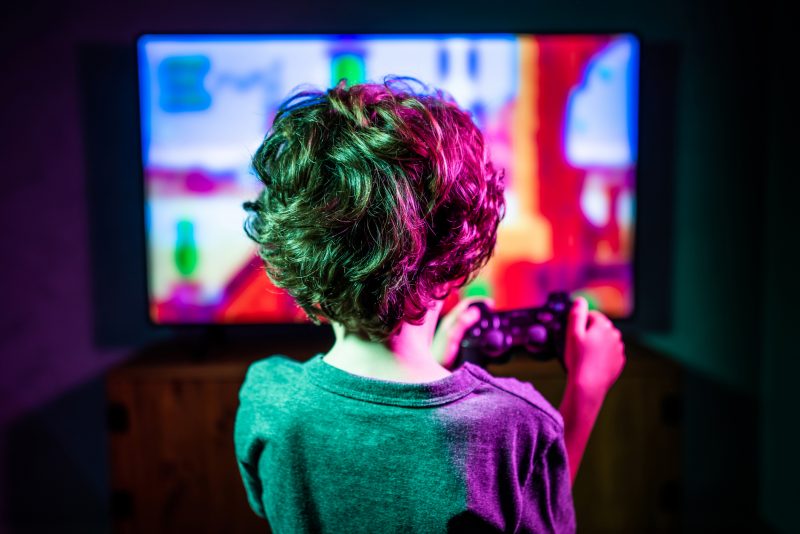 When you hear the word addiction, many parents immediately think of cigarettes, and drug and alcohol abuse. But, there is a wide range of compulsive behaviors that kids can excessively use to the point of disrupting their daily lives.
When you hear the word addiction, many parents immediately think of cigarettes, and drug and alcohol abuse. But, there is a wide range of compulsive behaviors that kids can excessively use to the point of disrupting their daily lives.
For some families today, parents are seeing an out-of-control attachment to technology use, such as compulsive online gaming, chronic YouTube watchers, TikTok and Instagram fanatics, obsessive texting and more. Addiction to online gambling and pornography also are posing problems for kids.
“The access teens have to technology, cell phones and other devices is different from their parents’ upbringing,” said Talia Brown, program coordinator for Akron Children’s Addiction Services Program. “That’s why many parents struggle with what’s normal and what’s concerning behavior.”
While much of this behavior is normal, it can easily turn into an addictive habit that can lead to harmful consequences for the child and family. Talia sheds light on behavioral addictions, risk factors, signs of abuse and how Akron Children’s can help.
What are signs of compulsive behavior?
Similar to a substance addiction, a child may engage in the behavior with increasing use of time. Once the interest begins to negatively impact a child’s daily functioning, such as losing sleep or stopping most other activities, there’s a problem.
Typical signs of behavioral addiction include:
- The behavior becomes physically and psychologically addictive to the point where kids have difficulty stopping or thinking about anything else
- Continually pushing the limit, frequent arguments, sudden mood changes, secretiveness or lying
- Loss of interest in favorite activities or hobbies
- Changes in eating or sleeping patterns, or sudden weight gain or loss
- Worsening depression or anxiety over time
- School problems, such as academic decline, or recent discipline problems
Are some kids at higher risk for behavioral addictions?
Anyone can exhibit compulsive behavior. However, certain conditions and circumstances make some kids more vulnerable than others, including:
- Mental health concerns, such as depression or anxiety
- Behavioral or impulse-control problems
- Need for an escape from problems or worries
- Peer or societal norms, exposure to advertising encouraging the behavior or easy access

Parents are the most influential individual in a child’s life and can play a significant role in preventing behavioral addictions.
How can parents help prevent this behavior?
Parents are the most influential individual in a child’s life and can play a significant role in preventing behavioral addictions. First and foremost, parents should model the appropriate behavior they’d like to see in their children.
Parents also need to be consistent, and set practical rules and appropriate boundaries around the behavior. For example, be firm and reinforce that your child can only play video games once homework and daily chores are completed.
In addition, fostering a child’s coping skills, mental health and an open, honest relationship can all serve to discourage compulsive behavior. Start the conversation by asking open-ended questions and listen without interruption, and show respect for your child’s point of view. Ask the reasons why your child is engaging in this behavior and see if you can spot an underlying cause.
Perhaps often overlooked in teens, a yearly physical with a trusted provider also is an important opportunity to identify any concerns.
When should parents seek help?
Kids at any age can become addicted to pleasurable activities or stimulation. If you notice your child is losing control over a behavior — the desire turns into an absolute need to engage — and it’s negatively impacting your child, address it as soon as possible.
Start with a pediatrician because they know your child’s medical history best. He can refer your child to an addiction services center for further assessment and treatment, if necessary.
What does treatment look like?
When a desire becomes a behavioral addiction, most likely it won’t go away without intervention. Family or individual counseling by a licensed professional can help.
At Akron Children’s Addiction Services Center, evidence-based talk therapies, such as cognitive behavioral therapy, are used to determine how children’s negative thoughts are affecting their behaviors. Kids learn coping skills to respond to these thoughts in a more effective way.
In addition, therapists look for underlying causes to treat. For example, a child may turn to gaming if school is too hard or they feel depressed. They also look for other interests that a child could engage in to find a better balance.
For severe behaviors or to treat underlying conditions, medication may be an option.
If your child is struggling with addictive behaviors, contact Akron Children’s Addictive Services Program at 330-543-5015. Telehealth appointments are available.
Learn more about Akron Children’s COVID-19 response and resources, and ways to prevent the spread.










